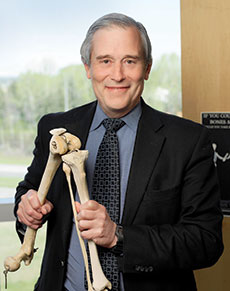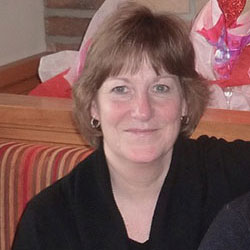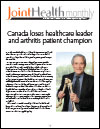In this issue
- Canada loses healthcare leader and arthritis patient champion
- A lifetime journey of discovery and achievement
- Reflections on a researcher and innovator
- Commitment to healthcare system innovation with meaningful patient involvement

 In March, Canadian healthcare and the arthritis community suffered a huge loss. Dr. Cy Frank, a talented orthopaedic surgeon, skilled researcher, policy maker, and champion for patient, passed away at the age of 65.
In March, Canadian healthcare and the arthritis community suffered a huge loss. Dr. Cy Frank, a talented orthopaedic surgeon, skilled researcher, policy maker, and champion for patient, passed away at the age of 65. As an accomplished orthopaedic surgeon practicing for 39 years, scientific researcher, teacher, entrepreneur, and health-system administrator, Dr. Frank will be missed, not only by those who knew him as a friend, mentor and a colleague, but also by all Canadians living with arthritis. He was a leader in the arthritis community, bringing together advocacy groups to improve the lives of Canadians living with arthritis. He promoted teamwork within the arthritis community and patient participation in their healthcare. His many achievements included patenting diagnostic devices, reforming healthcare policy, reducing waitlist times for hip and knee surgeries in Alberta, and leading the way towards Canada-wide models of care. In addition, he published a great number of research papers, books and book chapters, won a number of awards and honours, and was an inspiration and mentor to many. Dr. Frank was an innovator and a visionary with an unwavering passion for improving patients’ lives. His loss has left a void in the arthritis community that will not be easily filled.
This issue of JointHealth™ monthly is dedicated to the life and legacy of Dr. Frank. Read on to learn about a man who was admired for his compassion and pursuit of medical knowledge, healthcare innovation and visionary public policy.

1949
Born in Edmonton, Alberta
1976
Completed MD training at the University of Calgary
Designed research project that advanced knowledge of appropriate treatments for certain knee injuries.
1981 - 1984
Post-graduate studies at the University of California, San Diego
1984
Returned to the University of Calgary
Conducted clinical studies that determined the best treatments for knee injuries and osteoarthritis.
1989 - 2004
Founding member of Western Orthopaedic and Arthritis Research Foundation
1994
Founded TENET Medical Engineering
1998 - 2015
McCaig Professor in Joint Injury and Arthritis Research, University of Calgary
2001 - 2007
Founding director of the CIHR Institute for Musculoskeletal Health & Arthritis
2005 - 2015
Named a Member of the Canadian Academy of Health Sciences (CAHS) (an honour based on achievement in the academic health sciences in Canada)
Collaborated on a report that influenced international science funding bodies.
2005
Awarded International Bone and Joint Decade “Builder”
2007
Founded the McCaig Institute for Bone & Joint Health
Developed a system for drastically reducing wait times for hip and knee replacements in Alberta.
2011 - 2013
Founding director of the CIHR institute for Musculoskeletal Health & Arthritis
2011
Along with his Alberta Bone and Joint Initiative (ABJHI) colleagues, he received the CIHR of Health Research/Canadian Medical Association Journal Top Achievements in Health Research for 2010
Received for their work on “Improving access to hip and knee replacement and its quality by adopting a new model of care in Alberta”
2012
Presented with the University of Calgary Killam Research Leader Prize
2013
First councillor appointed by the province of Alberta to the Health Council of Canada
2013
Bone and Joint Canada recipient of the Canadian Institutes of Health Research/Institute of Musculoskeletal Health and Arthritis Knowledge Translation Award
2013
Received the Queen’s Diamond Jubilee Medal and the Order of the University of Calgary.
2013 - 2015
Appointed CEO of Alberta Innovates – Health Solutions (AIHS)
2014
Appointed to national Advisory Panel on Healthcare Innovation
Wrote a report recommending ways the federal government could better support and promote healthcare innovation.
2014
 Named a Member of the Order of Canada for his contributions to advancing orthopaedic healthcare services in Alberta and for his scientific contribution to bone and joint repair research
Named a Member of the Order of Canada for his contributions to advancing orthopaedic healthcare services in Alberta and for his scientific contribution to bone and joint repair research
Received for integrating research and care approaches to the treatment of bone and joint disorders, leading to improved delivery of care for hip and knee replacements in Alberta.


Reflections on a researcher and innovator
Cathy Hofstetter is the 2014 Qualman-Davies Arthritis Consumer Leadership Awardee.
Cathy Hofstetter was just starting out as a patient advocate when she first met Cy Frank in 2002 at the Osteoarthritis Consensus Conference in Toronto. She was new to the process and was uncomfortable because she felt she did not know much about osteoarthritis—she lives with rheumatoid arthritis. It soon became clear that Dr. Frank truly valued and embraced patient participation and input. So, in spite of her uneasiness she felt inspired to get fully involved at the event, and even moderated a panel. She and her fellow patient advocates were impressed with the way all the specialists were open to hearing the point of view of patients, but Dr. Frank stood out as the shining star: “He always made you feel comfortable and he would even seek you out for your opinion on things,” said Cathy.
As a member of the Canadian Arthritis Network’s Consumer Advisory Council, Cathy worked with Dr. Frank from 2002 to 2006. In that time, she noticed that he raised the bar at a conference or a planning meeting just by being there. “He was great, always spectacular, and always able to make you feel like an equal, and that you mattered,” she recalled. “He treated you like you belonged and that there was nothing wrong with a patient being part of the research. He talked in plain terms, demonstrated concepts, and had diagrams. And if you didn’t understand, he would stop and then explain again until you did understand.”
She thought the world of Dr. Frank, in part because he never presented himself a certain way in one situation and differently in another. When Cathy found out that Dr. Frank received the Order of Canada, she thought, “That’s what it’s about. It’s for people who are exactly as they appear.”
To Cathy, his loss represents a gaping hole in arthritis research and care. In her experience and others, he was generous with his knowledge, he never got riled, he was humble, calm, and never came across like he was the important person in the room. “He had no airs of superiority and no ego,” she said.
Cathy noted that the arthritis community is ahead of other diseases in patient participation. “As someone who nurtured and supported patient participation, Cy was proud when the Networks for Centres of Excellence acknowledged that as a true success of the Canadian Arthritis Network. And he was proud to have played a role in that achievement.”


Commitment to healthcare system innovation with meaningful patient involvement
Cheryl Koehn, president and founder of Arthritis Consumer Experts and a person living with rheumatoid arthritis and osteoarthritis, worked with Dr. Frank for many years. He was a friend and a mentor, whom she fondly refers to as “Dr. Sustainable.” That is because Dr. Frank was a strong believer in policy that led to sustainable healthcare. He understood that it did not make sense to build a policy and then only use it once—that it does not serve patients or the healthcare system. Most importantly, he felt that healthcare policy needed to be focused on the person living with diseases involving muscles, bones, and joints.
One of Dr. Frank’s many achievements was his work towards reducing hip and knee surgery waitlist times in Alberta. “Cy understood that knowing how the system was broken was critical to fixing it,” said Cheryl. “So he did extensive research to find out what caused waitlists to be long.” One of his discoveries was that patients were staying in hospital longer than they needed after their surgery. The evidence-based standard is that only four days are necessary, but it turned out that, on average, people who had hip surgeries were staying approximately 1.2 days longer and those who had knee surgeries were staying an extra three quarters of a day. To correct this problem, teams were set up to help patients leave within the four days. This resulted in significant cost savings and freed up beds for more patients. As a result of his study, 9 out of 10 patients were up and mobile the day of their surgery. They regained their physical functionality, and experienced less pain after their surgery. “If you’ve ever been a recipient of a surgical procedure, you’d know that’s a tremendous accomplishment,” Cheryl added.
The work that Dr. Frank did in Alberta led to a steady climb to leadership positions in research and government. Dr. Frank became the driving force behind a Canada-wide approach to improving healthcare delivery for people living with arthritis. “When a change needed to happen, Cy was the one who was brave enough to say so. He was the one who stepped up,” said Cheryl. “He had the right political capital, personality, and background. He was open and honest and could bring the views of many together. People liked Cy.”
Dr. Frank was the first scientific director of the CIHR’s Institute of Musculoskeletal Health and Arthritis (IMHA), which Cheryl felt was a defining moment in his policy life because it put him in Ottawa, near federal thought leadership and policy makers.
Dr. Frank later became a member of the prestigious Canadian Academy of Health Sciences, where he was chairman of a blue-ribbon committee that examined how best to measure the impact and return on investment of health research; the report they produced influenced science research funding bodies around the world.
From his research, Dr. Frank developed a patient pathway to healthcare, through the Arthritis Alliance of Canada, that was applied to national models of care plan for inflammatory types of arthritis. Models of care were designed to improve patient care and reduce healthcare costs by involving government, physicians, nurses, patients, the pharmaceutical industry, and allied health professionals (e.g. physical therapists, occupational therapists, and pharmacists) to ensure a coordinated effort from all parts of the health system.
As ever, Dr. Frank’s approach was to involve patients in the decision-making process and he brought the arthritis community together to work cooperatively. According to Cheryl: “Cy knew that encouraging consumer involvement was the right thing to do, and the smart thing to do.”
Reflecting back, Cheryl comments: “Cy had calmness about him. He juggled clinical, scientific, and government duties with seeming ease. Watching him in action, I saw that if you really have the desire, and know how, and there is a need, you can make good things happen.”
| “He was not just an accomplished surgeon, he was a great doctor wholly committed to making the lives of patients better. And he was such a great friend.” – Cheryl Koehn |
“Models of care” is a term that describes a standard for how healthcare services and resources are organized and delivered to patient communities. Models of care will incorporate established best practices and fill potential gaps for patient care, while considering the needs of individual province’s health systems.
Listening to you
We hope you find this information of use. Please tell us what you think by writing to us or emailing us at info@jointhealth.org. Through your ongoing and active participation, ACE can make its work more relevant to all Canadians living with arthritis.
Update your email or postal address
Please let us know of any changes by contacting ACE at info@jointhealth.org. This will ensure that you continue to receive your free email or print copy of JointHealth™ monthly.
Arthritis Consumer Experts (ACE)
Who We Are
Arthritis Consumer Experts (ACE) provides research-based education, advocacy training, advocacy leadership and information to Canadians with arthritis. We help empower people living with all forms of arthritis to take control of their disease and to take action in healthcare and research decision making. ACE activities are guided by its members and led by people with arthritis, leading medical professionals and the ACE Advisory Board. To learn more about ACE, visit: www.jointhealth.org
Acknowledgements
Over the past 12 months, ACE received unrestricted grants-in-aid from: AbbVie Corporation, Amgen Canada, Arthritis Research Canada, BIOTECanada, Bristol-Myers Squibb Canada, Canadian Institutes of Health Research, the Canadian Rheumatology Research Consortium, Celgene Inc., GlaxoSmithKline, Hoffman-La Roche Canada Ltd., Janssen Inc., Pfizer Canada, Purdue Pharma L.P., Sanofi Canada, St. Paul’s Hospital (Vancouver), UCB Canada Inc. and the University of British Columbia. ACE also receives unsolicited donations from its community members (people with arthritis) across Canada.
ACE thanks these private and public organizations and individuals.
Disclaimer
The material contained on this website is provided for general information only. This website should not be relied on to suggest a course of treatment for a particular individual or as a substitute for consultation with qualified health professionals who are familiar with your individual medical needs. Should you have any healthcare related questions, you should contact your physician. You should never disregard medical advice or delay in seeking it because of something you have read on this or any website.
This site may provide links to other Internet sites only for the convenience of World Wide Web users. ACE is not responsible for the availability or content of these external sites, nor does ACE endorse, warrant or guarantee the products, services or information described or offered at these other Internet sites.
Although the information presented on this website is believed to be accurate at the time it is posted, this website could include inaccuracies, typographical errors or out-of-date information. This website may be changed at any time without prior notice.
